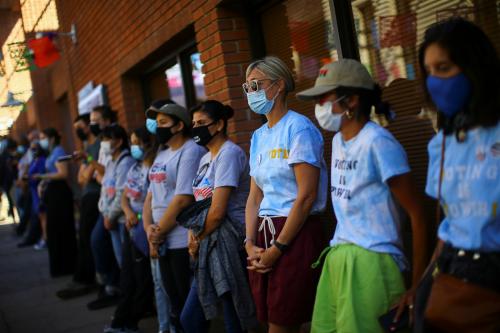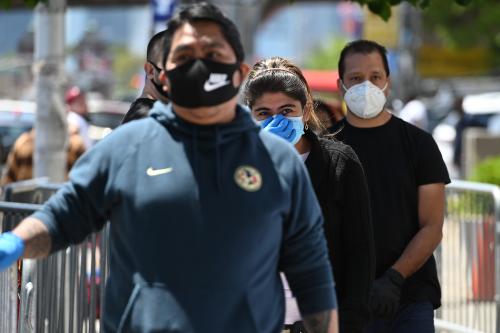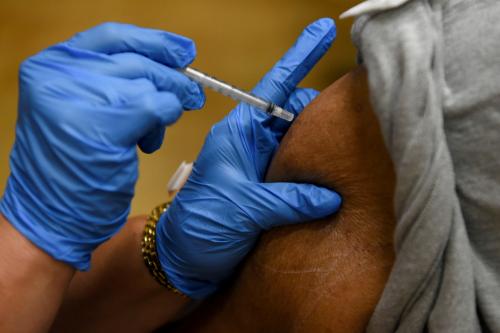As we now know—and as our team has documented elsewhere—Latino Americans are more likely than non-Hispanic whites to contract COVID-19 and to face disproportionately high mortality rates when they contract the virus.
What has not been well understood, outside of anecdotal accounts, is the impact COVID-19 is having on the economic well-being of Latino families. In a new Abriendo Puertas/Latino Decisions National Parent Survey that we conducted from June 12-19, 2020, we find that, beyond the health impacts of the virus, Latino families are also facing severe economic stress due to the COVID-19 recession. (The full results of the complete survey will be released in August.)[1]
While some of the trends in the results of the survey mirror those for all populations in the U.S. during the pandemic, the depth of economic distress being experienced by Latino families is deeply concerning and requires explicit attention from policymakers. Below are some of the sobering data-points from the survey that illustrate just how financially devastating COVID-19 has been for Latino families across the nation:
- Job losses. 29% of Latino families have had someone in their household lose their job since businesses across the country began shutting down due to COVID-19. Job losses among Latinos are highest among 18-29-year-olds and those with income levels of $25,000 or lower, with each rising to 37%.
- Business losses. 33% of Latino parents/primary caregivers have either seen their business shut down and/or have experienced significant drops in revenue. Given the huge role that Latino small-business owners have played in keeping the small-business component of the economy alive and well,[2] the fact that 1 in 3 Latino families have seen their businesses negatively impacted by COVID-19 is an inauspicious sign for the economic health of the small-business sector.
- Difficulties making housing payments. 41% of Latino parents/primary caregivers report having trouble paying for their rent or mortgage. The cost of housing has been more challenging for those who are renting their homes, as we see 49% of renters in the survey indicating that they are having trouble paying their rent compared to 35% for those who own their home.
- Underemployment. 52% of Latino parents/primary caregivers have had their work hours or their pay cut, but have kept their jobs.
Our survey highlights other dimensions of the economic vulnerability of Hispanic families. This is best reflected in the limited safety net that most respondents in our representative sample indicate that they have available to lean on during this difficult time. Nearly half (45%) of Hispanic families across the country have only $1,000 or less in savings for financial emergencies, and fully 20% with an astonishing $100 or less. Given these meager savings, it is not surprising that 42% of Latino families in the survey indicate that they have used up all of their family’s savings to pay for basic living expenses. The financial stress that families are under right now is reflected in families making “receiving help with wages and income” the most cited issue (32%) in an open-ended question to respondents asking them about the most important issues facing their community that the government should address.
Because of these limited assets, unfortunately, Latino families have had to make tough decisions in order to manage the deteriorating financial situations of their households during the pandemic. One of the most sobering findings from the survey is that about 1 in 4 (26%) of economically vulnerable Latino families have turned to pay-day or easy loan companies that charge high interest rates. Using this option is highest among parents with children aged 0-4 at 33%. This suggests a very rough road ahead for the economic trajectories of these families—particularly for the children in these families.
The rise in unemployment among Latinos has also generated a decrease in health insurance coverage among families, as 37% of respondents indicated that they or someone in their household have lost their employer-provided health insurance benefits. Among those who lost health insurance, 54% reported that their children lost their health insurance coverage as well. Unfortunately, this could mean that the significant improvements in health coverage for Latino families through the implementation of the Affordable Care Act could be wiped out by the recession caused by COVID-19.
As this survey makes clear, Latino families across the nation are struggling financially because of the severe impact that COVID-19 has had on the economy. They need as much support as possible to weather this storm.
We suggest that policymakers at both the state and national levels consider enacting policies that support Latino families. First, state and federal regulation of the often predatory short-term lending businesses should be enhanced to ensure that families facing dire economic consequences due to the public health crisis do not find themselves in financial ruin.
Second, policymakers at the state level should consider directing support to Latino families who are not eligible for federal funding due to their immigration status. And finally, as Congress debates the specifics of the next stimulus package in response to the pandemic, we hope lawmakers consider the importance of financially supporting the families that are so essential to providing food and other services to our nation.
The survey data referenced herein was produced independently by a third-party firm, BSP Research on behalf of the Abriendo Puertas/Opening Doors. Outside of his work at Brookings, Dr. Gabriel Sanchez serves as Director of Research for BSP Research and was part of the group of scholars who designed and implemented this survey.
Footnotes
- The survey queried 1,195 Latino parents and grandparents in English or Spanish to evaluate the economic vulnerability of Latino families during the COVID-19 pandemic. The survey has a +/- 2.8% margin of error, with larger margins for sub-samples. The large sample size of this national survey allows for comparisons to be made in attitudes and experiences across a number of sources of variation within the Latino community, including nativity, language use, and region.
- In fact, the number of majority Latino-owned employer businesses increased more than 13% between 2014 and 2016, compared to less than 3% growth for non-Latino-owned businesses.









Commentary
COVID-19 is having a devastating impact on the economic well-being of Latino families
July 27, 2020